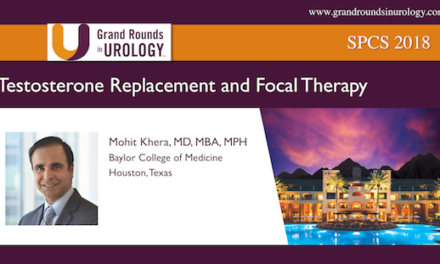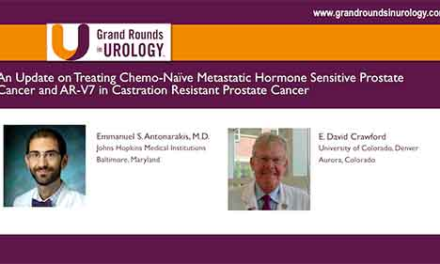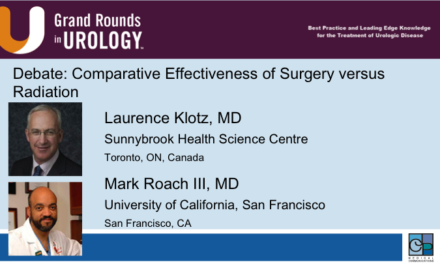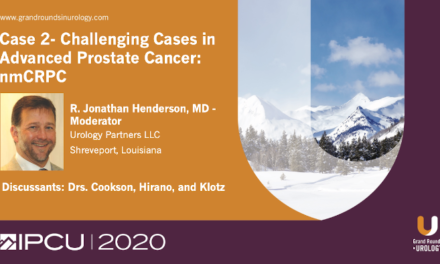Immunotherapy for Castration Resistant Prostate Cancer
Daniel P. Petrylak, MD, presented “Immunotherapy for Castration Resistant Prostate Cancer” during the 19th Annual Future Directions in Urology Symposium on August 11, 2018 in Colorado Springs, Colorado.
How to cite: Petrylak, Daniel P.. “Immunotherapy for Castration Resistant Prostate Cancer” August 11, 2018. Accessed [date today]. https://dev.grandroundsinurology.com/immunotherapy-for-castration-resistant-prostate-cancer/
Immunotherapy for Castration Resistant Prostate Cancer – Summary:
Daniel P. Petrylak, MD, provides a brief update on data regarding sipuleucel-T for castration resistant prostate cancer (CRPC), as well as pembrolizumab for microsatellite instability (MSI) -high metastatic prostate cancer patients.
Sipuleucel-T for Castration Resistant Prostate Cancer (CRPC)
Data shows that while sipuleucel-T provides a 4 month improvement in survival to CRPC patients, the drug does not show improvements in PSA levels, soft tissue disease, or bone scans. This phenomenon may be related to a delayed action from the immune system or interaction with treatments following sipuleucel-T. However, additional evidence suggests giving sipuleucel-T early in the course of CRPC may provide a survival benefit. Further studies are necessary in order to provide a definitive explanation for this phenomenon.
Checkpoint Inhibitors for Metastatic Prostate Cancer
Emerging data suggests that about 2% of patients with metastatic prostate cancer are also MSI-high. These patients are therefore suitable for treatment with pembrolizumab. The FDA recently approved pembrolizumab for MSI-high cancers originating in any location of the body. A confirmatory trial by De Bono et al. demonstrated that pembrolizumab has an ~11% higher response rate in patients with DNA repair mutations.
Overall, urologists need to better understand molecular markers, particularly MSI markers, for prostate cancer to select patients eligible for immunotherapy. Ongoing trials will provide further analysis of markers involved in prostate cancer immune response.
About Dr. Petrylak
Dr. Petrylak is the Professor of Urology and Medicine at the Smilow Cancer Hospital at Yale University. He has expertise in the research and development of new drugs and treatments, especially immunotherapies and checkpoint inhibitors, to fight prostate cancer.
About the Future Directions in Urology Symposium
The Future Directions in Urology Symposium (FDUS) is an annual collaborative meeting with a faculty consisting of the top researchers, physicians, and educators in the field of urology. During FDUS, experts provide updates on recent developments and debate innovative management approaches in genitourinary cancers and urologic conditions. Subsequently, the experts devise consensus statements in accordance with the discussions held in the meeting.
In this video, Dr. Petrylak discloses the thesis of the discussion he led during FDUS.
ABOUT THE AUTHOR
Daniel P. Petrylak, MD, is currently Director of Genitourinary Oncology, Professor of Medicine and Urology, Co-Leader of Cancer Signaling Networks, and Co-Director of the Signal Transduction Program at Yale University Cancer Center in New Haven, Connecticut. He is a recognized international leader in the urology field. He earned his MD at Case Western Reserve University School of Medicine in Cleveland Ohio. He then went on to complete his Internal Medicine Residency at Albert Einstein College of Medicine/Jacobi Medical Center in the Bronx, and his fellowship at Memorial Sloan Kettering Cancer Center in New York.
Dr. Petrylak has served as principal investigator (PI) or co-PI on several SWOG clinical trials for genitourinary cancers. Most notably, he served as the PI for a randomized trial that led to the FDA approval of docetaxel in hormone refractory prostate cancer. He also helped to design and served as PI for the SPARC trial, an international registration trial evaluating satraplatin as a second-line therapy for hormone refractory prostate cancer.
Dr. Petrylak served on the program committees for the annual meetings of the American Urological Association from 2003-2011, and for the American Society of Clinical Oncology from 1995-1997 and 2001-2003. He also has served as a committee member for the Devices and Immunologicals section of the FDA. He has published extensively in the New England Journal of Medicine, Journal of Clinical Oncology, Journal of the National Cancer Institute, Cancer Research, and Clinical Cancer Research.





